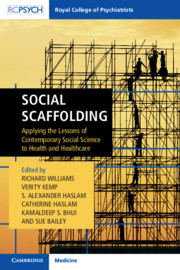Book contents
- Social Scaffolding
- Social Scaffolding
- Copyright page
- Contents
- Contributors
- Foreword
- Note
- Section 1 Schooling
- Section 2 Scoping
- Chapter 6 The Social Determinants of Mental Health
- Chapter 7 Laidback Science: Messages from Horizontal Epidemiology
- Chapter 8 Parity of Esteem for Mental Health
- Chapter 9 Belonging
- Chapter 10 Families and Communities: Their Meanings and Roles Across Ethnic Cultures
- Chapter 11 The Nature of Resilience: Coping with Adversity
- Chapter 12 The Value of Tolerance and the Tolerability of Competing Values
- Chapter 13 Towards Partnerships in Health and Social Care: A Coloquium of Approaches to Connectedness
- Chapter 14 Commentaries on Core Themes in Section 2
- Section 3 Sourcing
- Section 4 Scaffolding
- Section 5 Sustaining
- Index
- References
Chapter 12 - The Value of Tolerance and the Tolerability of Competing Values
from Section 2 - Scoping
Published online by Cambridge University Press: 14 June 2019
- Social Scaffolding
- Social Scaffolding
- Copyright page
- Contents
- Contributors
- Foreword
- Note
- Section 1 Schooling
- Section 2 Scoping
- Chapter 6 The Social Determinants of Mental Health
- Chapter 7 Laidback Science: Messages from Horizontal Epidemiology
- Chapter 8 Parity of Esteem for Mental Health
- Chapter 9 Belonging
- Chapter 10 Families and Communities: Their Meanings and Roles Across Ethnic Cultures
- Chapter 11 The Nature of Resilience: Coping with Adversity
- Chapter 12 The Value of Tolerance and the Tolerability of Competing Values
- Chapter 13 Towards Partnerships in Health and Social Care: A Coloquium of Approaches to Connectedness
- Chapter 14 Commentaries on Core Themes in Section 2
- Section 3 Sourcing
- Section 4 Scaffolding
- Section 5 Sustaining
- Index
- References
Summary
Earlier and later chapters in this book explore the importance of membership of communities of values; whether gangs or sports teams, or in sharing adversity such as natural disasters (see, for example, Chapters 3, 4, 11, 16 and 17). At this point, and before moving into some specific scenarios in Section 3, and a closer examination of practical aspects of social identity theory in Section 4, we see it as important to take stock, on one hand, and set some challenges for social scientists to reflect upon later in this book. Section 1 identified the lens of sociability through which we are examining the human condition together with recent approaches to understanding the power of social connectedness and, within that, social identity, for our health. Chapter 13 brings together many of the concepts covered in Sections 1 and 2.
Information
- Type
- Chapter
- Information
- Social ScaffoldingApplying the Lessons of Contemporary Social Science to Health and Healthcare, pp. 105 - 113Publisher: Cambridge University PressPrint publication year: 2019
